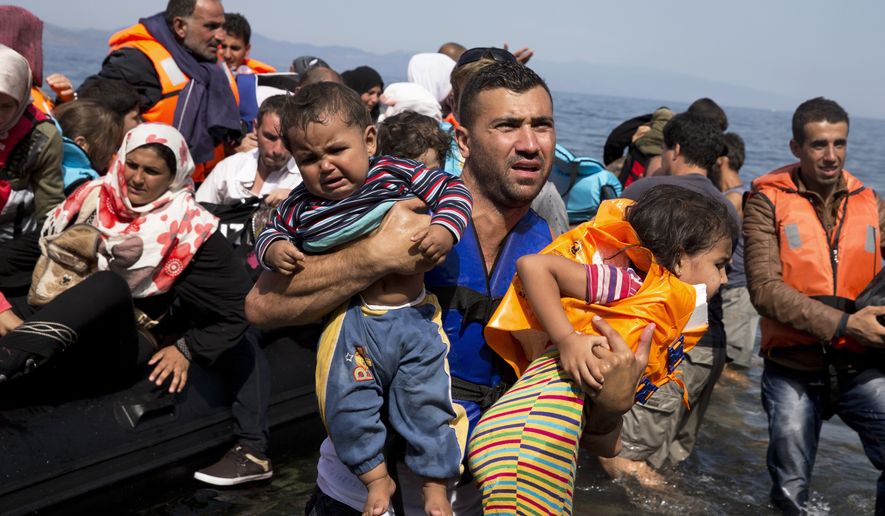The U.S. accepted more than 2,300 Syrian refugees in June alone, sending the fiscal year total soaring past the 5,000 mark and putting the government on track to surpass President Obama’s goal of 10,000 by the end of September, but raising questions about screening out potential terrorists.
June’s numbers set a monthly record for the Homeland Security and State departments, which committed resources received earlier this year to streamline the process — in what critics say amounted to corner-cutting — to get back on track toward Mr. Obama’s political goal.
“I believe we will make the 10,000,” Homeland Security Secretary Jeh Johnson testified to Congress on Thursday, assuaging fears of some Democrats that the administration was going to fall short.
Of those accepted in June, more than 99 percent are Sunni Muslims. Just eight identified themselves as Christian, eight identified as a non-Sunni form of Islam, and one reported having no religious affiliation. Those numbers have drawn criticism because the percentage of Sunni Muslims is far greater than that of the Syrian population as a whole, which is about 75 percent Sunni.
Mr. Obama vowed last year to take 10,000 refugees as a way to help Syrians caught in a 5-year-old civil war, in which the Assad government, Islamist militants and Western-backed rebels are fighting for control of the country. Security officials warned that it would be difficult to check the histories of refugees, but Mr. Obama dismissed those fears and started the process.
It began slowly, but a surge of resources has put the refugee program on track.
Michigan, which has a large Muslim enclave around Detroit, accepted more than 10 percent of the refugees in June. The South is increasingly a destination as well, with massive increases in Roanoke, Virginia; Columbia, South Carolina; Raleigh, North Carolina; and Nashville, Tennessee.
Boise, Idaho, had the biggest surge by percentage, jumping from one refugee in the previous eight months to 20 by the end of June — a total of four more families.
“Since these families arrived just this month, they’re going through the process that any other refugee arriving in the U.S. or Idaho would go through,” said Jan Reeves, director of the Idaho Office for Refugees, which orchestrates resettlements in the state.
No security breaches have been confirmed, though there have been instances that have raised the temperature of the debate. In Twin Falls, Idaho, in June, online news outlets erroneously reported that Syrian refugee teens were involved in the sexual assault of a girl. Authorities now say the perpetrators were Iraqi and Sudanese teens.
Mr. Reeves said the misinformation was spread by a group of citizens in Twin Falls who have resisted refugee resettlement. “That was an inflammatory kind of response to a sad incident,” he said.
Also getting a spike in June was Roanoke, which went from one to 15 Syrian refugees for the fiscal year.
Last year, Roanoke Mayor David Bowers, a Democrat, suggested his city resist efforts to resettle refugees because of a fear of infiltration by Islamic State terrorists. He was kicked off Hillary Clinton’s presidential campaign organization as a result of his remarks.
Mr. Bowers didn’t respond to several requests for comment from The Washington Times this week on how his city is dealing with the refugees.
Syrian refugees have been placed in 167 communities, touching most states. But the District of Columbia — the seat of the federal government — has not received any refugees, according to the latest statistics.
Refugees also have not resettled in Delaware, Vermont, Alabama, Mississippi, Arkansas, Montana, Wyoming, Hawaii, Alaska or either of the Dakotas.
Refugees often come as families, and about half of those admitted in June were children younger than 14. About 10 percent were males ages 14 to 30 — the demographic most likely to be radicalized.
The quickened pace of approvals also has analysts worried. They say nothing has been done to improve screening, so it’s unclear why the government feels more comfortable moving faster.
“It should be of great concern that these refugees are being processed so rapidly now,” said Jessica Vaughan, policy studies director at the Center for Immigration Studies.
“It is no easier for the U.S. government to vet these people now than it was when FBI Director [James B.] Comey made his statement that it can’t be done. What has changed is there is now enormous pressure on the officers who are reviewing these cases to do it quickly. And that never ends well,” she said.
Fears of infiltration grew last year after at least one of those involved in the Paris terrorist attack was identified as a Syrian who sneaked into the country amid the flood of refugees into European countries, overwhelming governmental screening efforts.
Officials insisted screening was tighter in the U.S. because all refugees have to be vetted. They pointed to the success of the U.S. program in bringing Iraqi refugees as evidence that they could successfully operate in troubled countries.
But in January, the Justice Department announced terrorism-related charges against two Iraqi refugees — one of whom was living in Syria at the time he was accepted into the U.S.
“This is being done really based on hope more than knowledge,” Ms. Vaughan said.
The U.S. relies on a United Nations agency to identify potential refugees, then American officials conduct their own screening from that pool.
Republicans have accused international officials of skewing the pool toward Muslims, filtering out potential Christian refugees. But the U.N. High Commissioner for Refugees says it is not manipulating the numbers, and few Christians are registering with it in the first place.
• Stephen Dinan can be reached at sdinan@washingtontimes.com.




Please read our comment policy before commenting.